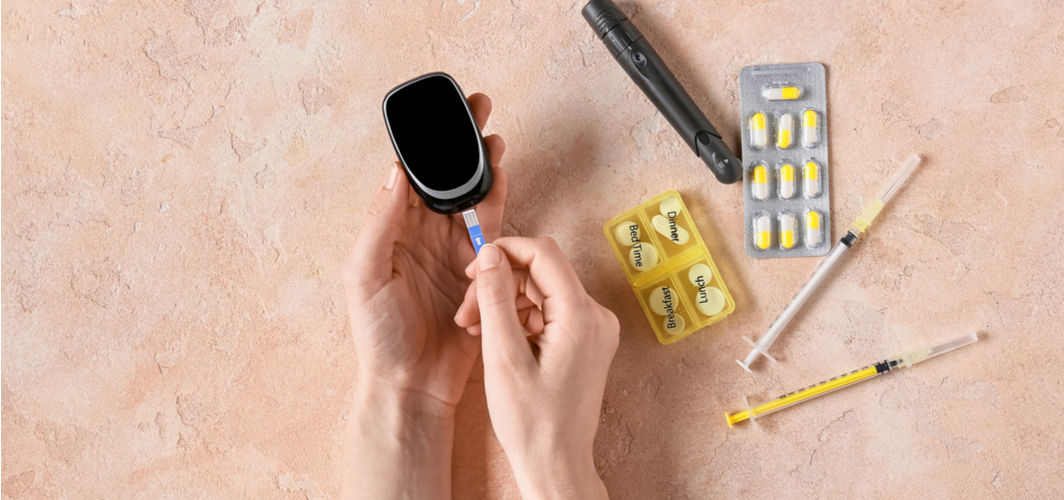Diabetes Management
What Travel Essentials Should People with Diabetes Carry?
5 min read
By Apollo 24/7, Published on - 19 November 2020, Updated on - 13 September 2023
Share this article
0
2 likes

What travel essentials should people with diabetes carry?
- Glucose meter: Ideally, diabetic people should always carry a glucose meter (or glucometer) with them.
- Changes in time zones, food, and activity levels can affect their blood glucose. They might need to check their blood sugar more frequently to monitor and make adjustments if needed.
- Weather and altitude are shown to affect the test results of glucose monitoring devices. Hence, one should read about the device or clarify all device-related doubts with the pharmacist/manufacturer before travelling.
- Oral diabetes medication: People with diabetes must pack their oral medications so that they do not miss a dose. These should be carried in enough and extra quantities to ensure that they do not run out of medications. Other medications that need to be taken regularly must also be packed.
- Insulin pump: Individuals who use an insulin pump to take insulin shots for regulating blood sugar should make that they carry all the supporting documents including the prescriptions from the doctor during travel.
- Extra battery for the glucose meter or insulin pump: Diabetic people must carry an extra battery for glucose meters or insulin pumps.
- For a glucose meter, the battery power may be lost suddenly, and as the batteries differ across manufacturers, it is important to know the type and keep a spare in the testing kit.
- Insulin pumps provide an indication when the battery goes low, hence carrying an extra battery may not be necessary. However, carrying a spare is a good idea.
- Insulin: Diabetic people on treatment with insulin injections are advised to carry a sufficient amount of it. They must also pack an insulated bag with a few ice packs or cool bags to keep the insulin cool. It is important to read the instructions on storage or temperature conditions as insulin activity is subject to changes in temperature.
- Syringes: People using syringes must carry an ample amount so that it lasts for the entire trip.
- Test strips: One must carry enough and extra test strips as testing may be required more frequently than expected.
- Lancing device and lancets: One must carry lancets needed for the entire day of testing. Doctors recommend using sterile lancets every time they test. Therefore, patients should always pack enough lancets.
- Non-medical supplies: One must also carry a few necessary non-medical supplies such as alcohol swabs, tissues, and hand sanitizer while travelling.
- Fast-acting glucose: It is necessary to carry a small supply of fast-acting glucose, as diabetic people are at risk of low blood sugar levels (hypoglycemia) when they use insulin or certain other medications. Glucose tablets or glucose gels are fast-acting sources of glucose which enable the body to absorb glucose rapidly.
- Glucagon emergency kit: This kit is crucial for people with diabetes as it contains glucagon for injection. It can be used in emergencies when their blood glucose level falls too low, and they become unconscious or are unable to swallow.
- Small, packaged snacks: One must always carry a packet of peanut butter, whole-grain crackers, or a fruit juice box to manage low blood sugar immediately.
- Medical identification: It is a good idea for diabetic individuals to carry a medical ID card stating that they have diabetes. This will help the emergency personnel address their diabetes needs immediately.
- Medical history: In the case of extensive travel, people with diabetes are advised to carry a copy of their health history and prescriptions. It contains the existing medical conditions, any allergies, medications, emergency contact information, and the details of their healthcare providers. The medical history can also be stored on the phone using any of the medical/health apps.
- Health insurance card: One must carry a health insurance card for any unforeseen medical emergencies that can arise. Investing in travel insurance is also advisable for such individuals.
Conclusion
Diabetes Management
Consult Top Diabetologists
View AllLeave Comment
Recommended for you

Diabetes Management
These Foods Can Increase Your Risk Of Diabetes
Nitrates and nitrites in processed foods may increase the risk of type 2 diabetes. It is important to avoid foods containing nitrates and have a balanced diet that is low in refined carbohydrates, high in fibre and rich in nutrients.

Diabetes Management
How Does Vitamin D Benefit People with Diabetes?
Vitamin D offers several health benefits for individuals with diabetes. It plays a crucial role in improving insulin sensitivity, which further helps in regulating blood sugar levels more effectively. Adequate vitamin D levels in your body may also reduce the risk of developing type 2 diabetes. Vitamin D's role in regulating calcium absorption is crucial for insulin and glucose uptake.

Diabetes Management
Can Diabetic Dementia be Reversed?
Diabetic dementia is a condition linked to diabetes that impacts cognitive function. There are effective strategies to manage and mitigate its effects, allowing for an improved quality of life. One crucial aspect of managing diabetic dementia is achieving and maintaining optimal blood sugar control. Lifestyle modifications also play a pivotal role in addressing diabetic dementia. Regular physical activity, such as aerobic exercises and strength training, enhances insulin sensitivity, reduces inflammation, and promotes overall brain health. Maintaining a balanced diet rich in essential nutrients, fibre, and healthy fats can further support insulin regulation and reduce the risk of cognitive impairment.
Subscribe
Sign up for our free Health Library Daily Newsletter
Get doctor-approved health tips, news, and more.
Visual Stories

8 Fruits That are Incredibly Healthy for Diabetes
Tap to continue exploring
Recommended for you

Diabetes Management
These Foods Can Increase Your Risk Of Diabetes
Nitrates and nitrites in processed foods may increase the risk of type 2 diabetes. It is important to avoid foods containing nitrates and have a balanced diet that is low in refined carbohydrates, high in fibre and rich in nutrients.

Diabetes Management
How Does Vitamin D Benefit People with Diabetes?
Vitamin D offers several health benefits for individuals with diabetes. It plays a crucial role in improving insulin sensitivity, which further helps in regulating blood sugar levels more effectively. Adequate vitamin D levels in your body may also reduce the risk of developing type 2 diabetes. Vitamin D's role in regulating calcium absorption is crucial for insulin and glucose uptake.

Diabetes Management
Can Diabetic Dementia be Reversed?
Diabetic dementia is a condition linked to diabetes that impacts cognitive function. There are effective strategies to manage and mitigate its effects, allowing for an improved quality of life. One crucial aspect of managing diabetic dementia is achieving and maintaining optimal blood sugar control. Lifestyle modifications also play a pivotal role in addressing diabetic dementia. Regular physical activity, such as aerobic exercises and strength training, enhances insulin sensitivity, reduces inflammation, and promotes overall brain health. Maintaining a balanced diet rich in essential nutrients, fibre, and healthy fats can further support insulin regulation and reduce the risk of cognitive impairment.